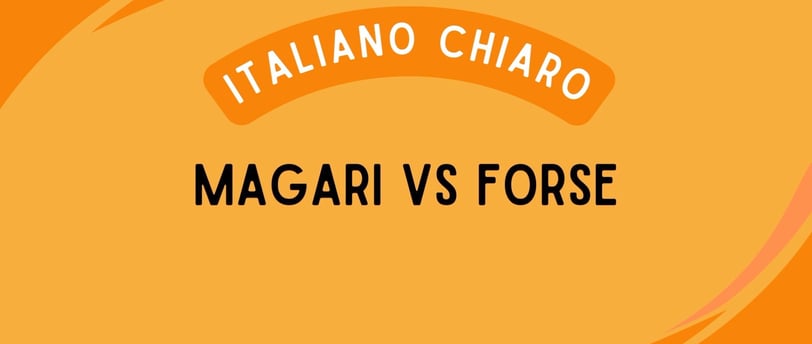Magari vs. Forse: The Difference Explained
VOCABOLARIOGRAMMATICA


Italian is a beautiful and expressive language, filled with nuances that can sometimes be challenging to grasp. In this video, we will explore the subtle distinctions between two commonly used words: 'Magari' and 'Forse.' Understanding these differences will not only enhance your language skills but also provide valuable insights into when to infuse excitement or maintain neutrality in your conversations.
Magari: The Exciting Possibility
'Magari' is a versatile Italian word that can be translated as "maybe," "perhaps," or "if only." It carries a sense of hope and excitement, often used to express a desire or a wish for something. When used in conversations, 'Magari' can convey enthusiasm, anticipation, and a positive outlook.
For example, if someone asks you if you would like to go on a trip to Italy, you can respond with "Magari!" This response implies that you are excited about the possibility and would love to go.
Forse: The Neutral Option
On the other hand, 'Forse' is a more neutral word that translates to "maybe" or "perhaps." It is used to express uncertainty or doubt without any particular emotional connotation. 'Forse' is often employed when discussing probabilities, potential outcomes, or when expressing a lack of certainty.
For instance, if someone asks you if it will rain tomorrow, you can respond with "Forse." This response indicates that you are unsure about the weather conditions and cannot provide a definite answer.
Using Magari and Forse in Context
Knowing when to use 'Magari' and 'Forse' is essential to communicate effectively in Italian. While 'Magari' is used to express excitement and possibility, 'Forse' is employed to convey neutrality and uncertainty.
Here are a few examples to help you understand their usage:
"Magari vinco alla lotteria!" - "If only I win the lottery!"
"Forse andrò al cinema stasera." - "Maybe I'll go to the cinema tonight."
"Magari potessi parlare italiano fluentemente." - "If only I could speak Italian fluently."
"Forse dovremmo prendere un'ombrello." - "Maybe we should take an umbrella."
By incorporating 'Magari' and 'Forse' into your Italian vocabulary, you will be able to express yourself more precisely and convey the right emotions in different situations. Practice using these words in conversations, and you will gradually develop a deeper understanding of their subtle nuances.
So, whether you want to express excitement or maintain neutrality, 'Magari' and 'Forse' are two essential words to add to your Italian language repertoire. Watch the video linked above to dive deeper into their usage and explore more examples.
Explore the richness of Italian expression and enhance your language journey! Start incorporating 'Magari' and 'Forse' into your conversations, and you'll be one step closer to mastering the beauty of the Italian language.
#ItalianLanguage #LanguageLearning #MagariVsForse #ItalianExpressions #LanguageTips #LearnItalian #ItalianCulture #LanguageLovers #OnlineLearning
🌐✨
